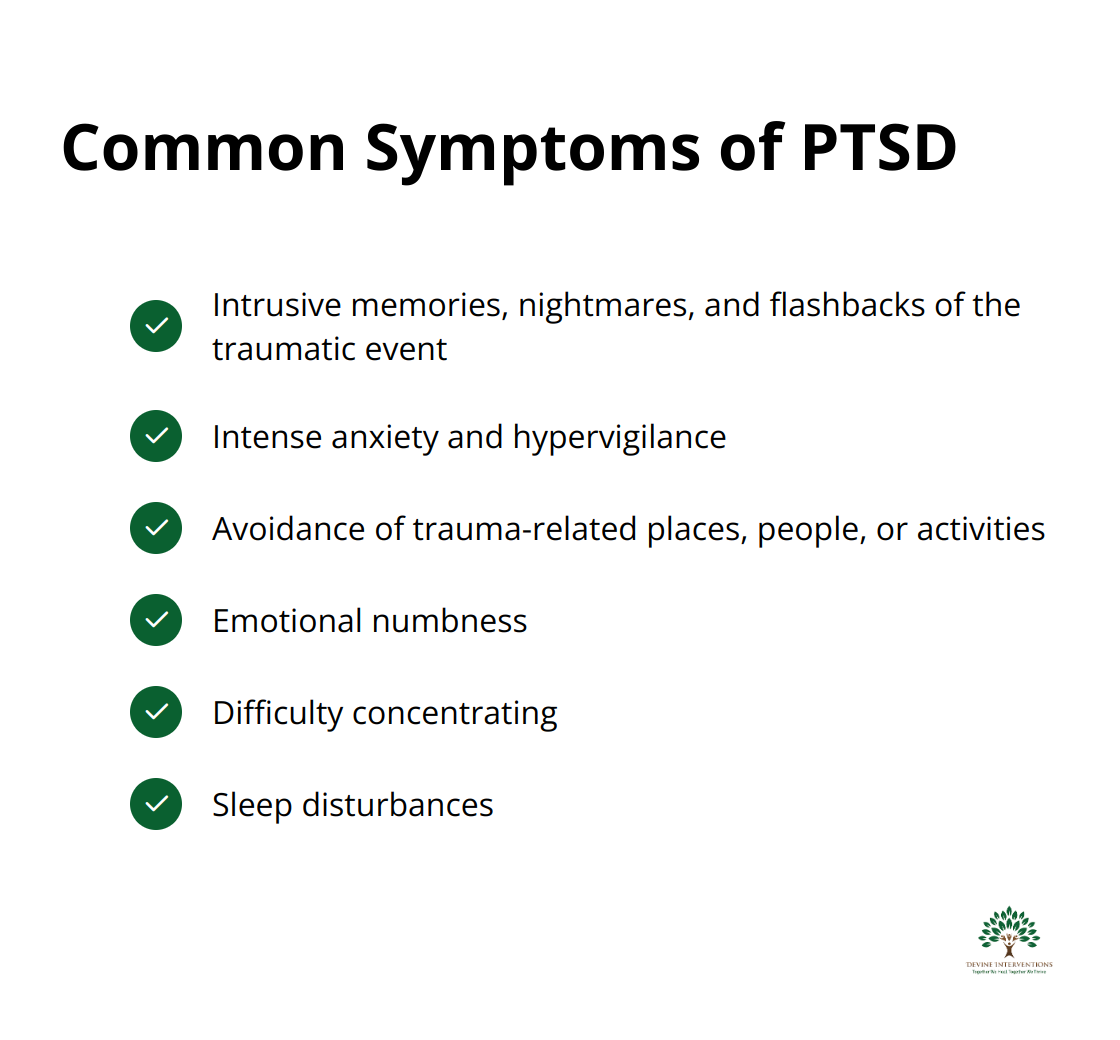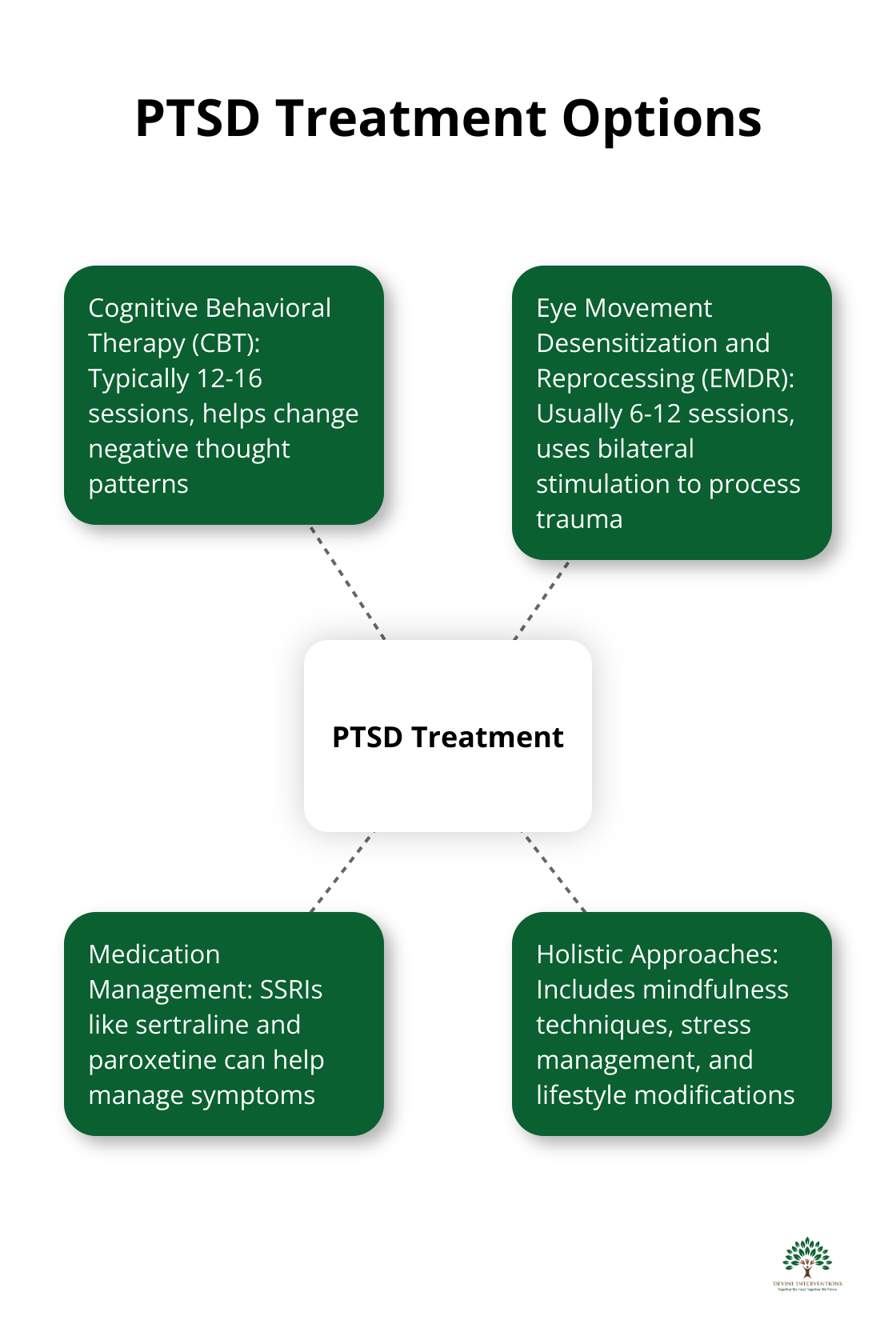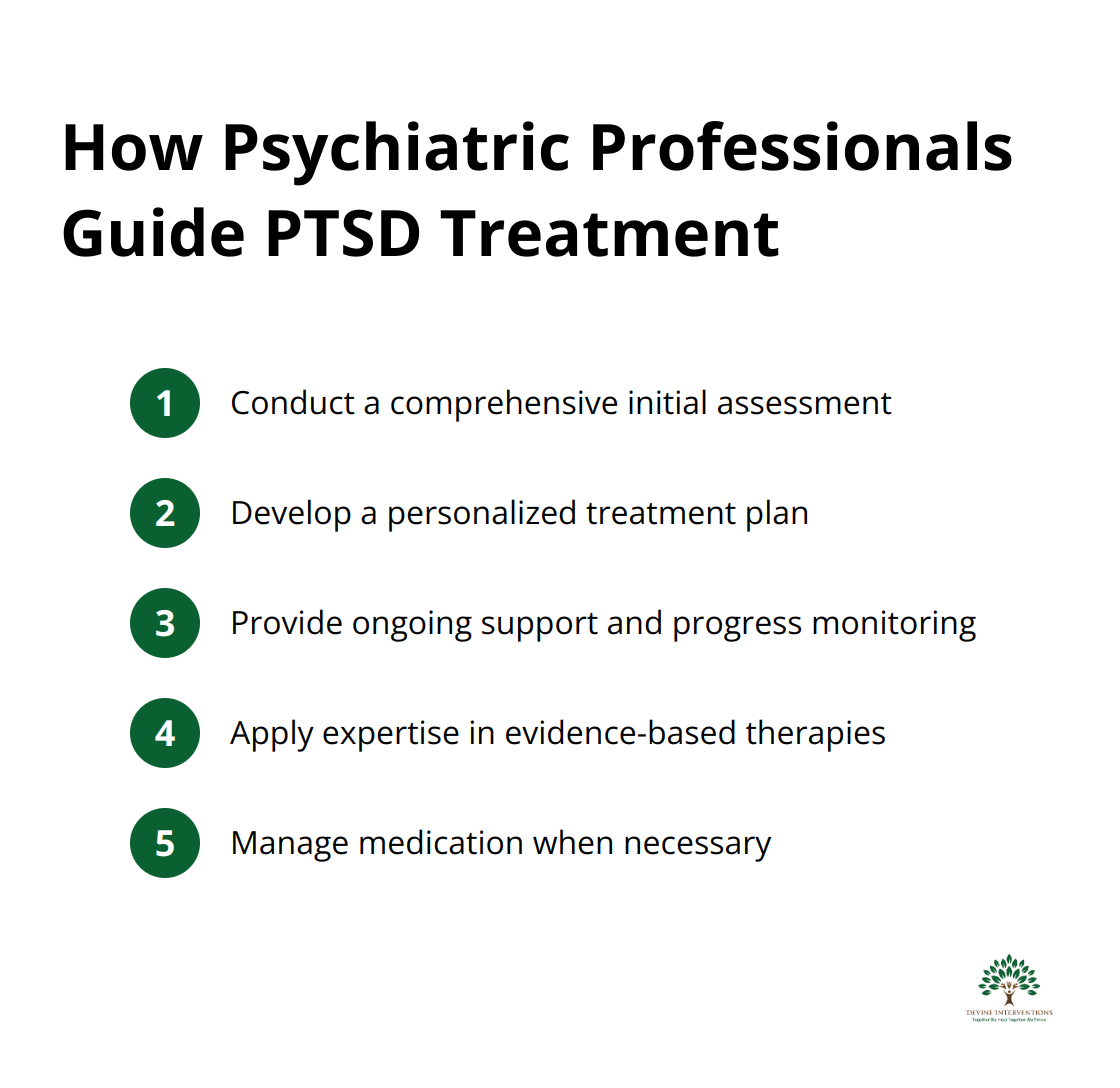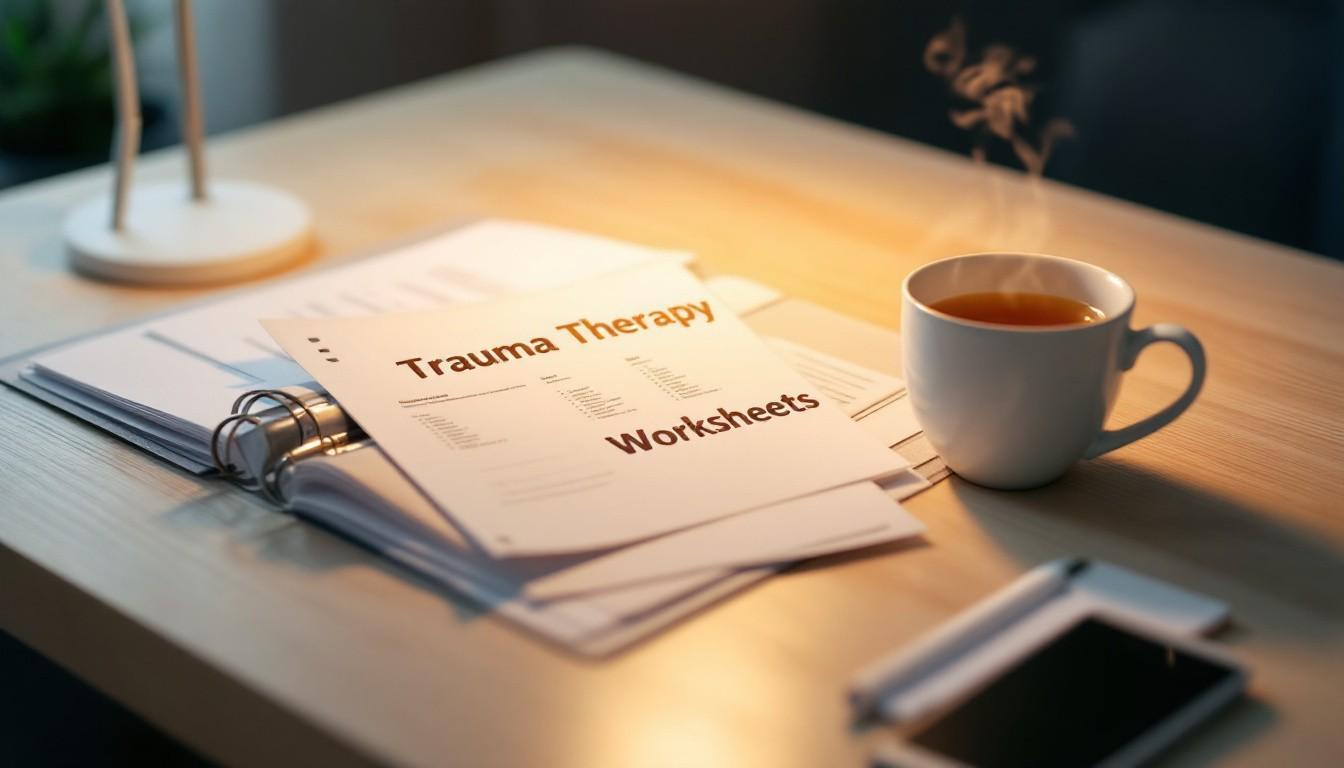PTSD can be a debilitating condition, affecting every aspect of a person’s life. At Devine Interventions, we understand the challenges faced by those struggling with this disorder.
Professional help is key to managing PTSD symptoms and reclaiming control over one’s life. This post explores effective treatment options and the crucial role of trusted psychiatric professionals in the recovery process.
Understanding PTSD and Its Impact on Daily Life
What is Post-Traumatic Stress Disorder (PTSD)?
Post-Traumatic Stress Disorder (PTSD) is a mental health condition that’s caused by an extremely stressful or terrifying event – either being part of it or witnessing it. It can significantly disrupt a person’s ability to function in everyday life.
Common Symptoms of PTSD
PTSD symptoms often include:
- Intrusive memories, nightmares, and flashbacks of the traumatic event
- Intense anxiety and hypervigilance
- A constant feeling of being on edge
- Avoidance of places, people, or activities that remind them of the trauma
- Emotional numbness
- Difficulty concentrating
- Sleep disturbances

How PTSD Affects Daily Life
The effects of PTSD can be far-reaching and impact various aspects of a person’s life:
- Work Performance: Individuals might struggle with concentration and productivity (which can lead to job loss or career setbacks).
- Social Interactions: Simple tasks like grocery shopping or attending social gatherings may trigger anxiety or panic attacks.
- Relationships: Partners and family members may feel helpless or frustrated, not knowing how to provide support.
The Importance of Professional Help
Professional help is essential for managing PTSD effectively. While some people might try to cope on their own, this often leads to unhealthy coping mechanisms (such as substance abuse or self-isolation). Professional treatment can provide the tools and support needed for recovery.
Evidence-based therapies like Cognitive Behavioral Therapy (CBT) and Eye Movement Desensitization and Reprocessing (EMDR) help clients process trauma and develop healthy coping strategies. These treatments, combined with medication management when necessary, can significantly improve quality of life for those with PTSD.
PTSD doesn’t have to control your life. With the right support and treatment, recovery is possible. The next section will explore effective treatment options in detail, providing hope and a clear path forward for those struggling with PTSD.
Effective PTSD Treatments That Work
PTSD treatment has advanced significantly in recent years. Evidence-based therapies have shown real results for individuals struggling with this condition. A recent study provides promising data on the outcomes associated with a modified CPT protocol for treating PTSD in a high need but under-treated SMI population. Let’s explore some of the most effective options available today.
Cognitive Behavioral Therapy (CBT) for PTSD
CBT forms the foundation of PTSD treatment. This therapy helps you identify and change negative thought patterns related to your trauma. A typical CBT course for PTSD lasts 12 to 16 sessions. During these sessions, you’ll learn practical skills to manage anxiety, process traumatic memories, and regain control over your thoughts and emotions.
One CBT technique often used is exposure therapy. This involves facing trauma-related memories and situations gradually in a safe environment. While it may sound challenging, exposure therapy has helped many individuals reduce their PTSD symptoms significantly.
Eye Movement Desensitization and Reprocessing (EMDR)
EMDR is another powerful tool in the PTSD treatment arsenal. This therapy uses bilateral stimulation (usually eye movements) while you recall traumatic memories. It might sound unusual, but EMDR has shown impressive results in helping people process trauma.
A typical EMDR treatment course consists of 6 to 12 sessions. Recent research found that EMDR was significantly more effective than placebo in reducing symptoms of PTSD. However, the number of sessions needed can vary depending on the individual and the nature of their trauma.

Medication Management for PTSD
While therapy plays a central role, medication can also contribute significantly to managing PTSD symptoms. Selective Serotonin Reuptake Inhibitors (SSRIs) are often prescribed to help with symptoms like anxiety and depression. The FDA has approved two SSRIs specifically for PTSD treatment: sertraline (Zoloft) and paroxetine (Paxil).
It’s important to note that medication isn’t a standalone solution. Combining medication with therapy often yields the best results. Psychiatric professionals work closely with each client to find the right medication and dosage, adjusting as needed to minimize side effects and maximize benefits.
Holistic Approaches to PTSD Treatment
A comprehensive approach to PTSD treatment often includes holistic practices. Mindfulness techniques, stress management strategies, and lifestyle modifications (such as regular exercise and improved sleep habits) can complement traditional therapies. These practices help individuals not just manage their symptoms, but truly heal and reclaim their lives.
PTSD is a treatable condition. With the right help and support, recovery is possible. If you’re struggling with PTSD, don’t hesitate to reach out to a trusted mental health provider. Taking the first step towards healing can open the door to a brighter future. In the next section, we’ll explore the vital role that trusted psychiatric professionals play in the PTSD treatment process.
How Psychiatric Professionals Guide PTSD Treatment
Psychiatric professionals play a vital role in PTSD treatment. They provide expert guidance throughout the recovery journey. Here’s how these professionals make a difference:
Comprehensive Initial Assessment
The first step in effective PTSD treatment involves a thorough assessment. Initial consultations typically include a general medical and psychiatric evaluation, as well as a mental status examination. This approach allows professionals to understand the full scope of your PTSD and its impact on your life.
Professionals don’t just focus on symptoms. They explore how PTSD affects your relationships, work, and daily activities. This holistic view helps create a treatment plan that addresses all aspects of your life affected by PTSD.

Personalized Treatment Planning
Based on the initial assessment, psychiatric professionals develop a tailored treatment plan. They believe in collaborative care, making you an equal partner in decision-making about your treatment.
Your treatment plan might include a combination of therapy types (such as Cognitive Behavioral Therapy or Eye Movement Desensitization and Reprocessing). If medication is appropriate, professionals will discuss options and potential benefits. They also consider holistic approaches like stress management techniques or lifestyle changes that can support your recovery.
This personalized approach ensures that your treatment addresses your specific needs and goals. It’s not a one-size-fits-all solution, but a carefully crafted plan designed for your unique situation.
Ongoing Support and Progress Monitoring
PTSD treatment requires ongoing support and adjustments. Psychiatric professionals provide consistent care throughout your treatment process.
Follow-up appointments typically involve individual sessions. During these sessions, professionals monitor your progress, address any new challenges, and adjust your treatment plan as needed.
They also use objective measures to track your progress. This might include standardized assessments or questionnaires that measure PTSD symptoms. By regularly reviewing these metrics, professionals ensure your treatment stays on the right track.
If you need to provide progress reports (for example, to probation officers), professionals can generate monthly reports while respecting your confidentiality.
Expertise in Evidence-Based Therapies
Psychiatric professionals specialize in evidence-based therapies proven effective for PTSD. They receive extensive training in techniques like Cognitive Processing Therapy (CPT) and Prolonged Exposure (PE) therapy.
These professionals stay updated on the latest research and treatment methods. They adapt their approach based on new findings, ensuring you receive the most current and effective care available.
Medication Management
For some individuals with PTSD, medication can provide significant relief. Psychiatric professionals have the expertise to prescribe and manage medications effectively.
They carefully evaluate your symptoms and medical history to determine if medication could benefit you. If so, they’ll work with you to find the right medication and dosage, monitoring for side effects and adjusting as needed.
Psychiatric professionals offer more than just treatment – they provide a supportive partnership throughout your recovery journey. With their expertise and guidance, you can navigate the challenges of PTSD and work towards lasting healing and improved quality of life.
Final Thoughts
PTSD presents significant challenges, but recovery is achievable with proper support and treatment. Evidence-based therapies like CBT and EMDR, along with medication management and holistic approaches, offer comprehensive paths to healing. Trusted psychiatric professionals play a vital role in guiding individuals through their PTSD recovery journey, providing thorough assessments and personalized treatment plans.
Professional support can make a substantial difference in recovery and overall quality of life for those struggling with PTSD. At Devine Interventions, we offer compassionate, evidence-based care for individuals dealing with PTSD. Our experienced team provides a range of services, including therapy, medication management, and holistic approaches, all designed to support your journey to recovery.
Don’t allow PTSD to control your life any longer. Take the first step towards healing by reaching out to Devine Interventions today. Our dedicated team stands ready to support you every step of the way, helping you build resilience, develop effective coping strategies, and work towards a brighter future.







